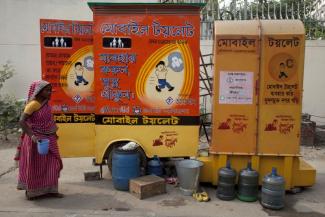Standardisation
Turning wastewater into drinking water

In 2010, the United Nations declared sanitation a human right. Even so, more than a third of humanity still has no access to fully operational sanitary facilities and wastewater disposal infrastructure. In unsanitary conditions, viruses, bacteria and other pathogens spread fast. Around 80 % of illnesses in developing countries result from contaminated water and poor sanitary conditions. Annually, infectious diarrhoea kills 1.4 million children under six – more than malaria, measles and AIDS combined.
Basic facilities such as latrines and septic tanks solve only part of the problem. In many cases, they do not add up to a safe disposal system. There are often serious gaps in the infrastructure needed to maintain – or merely empty – sanitation facilities. Leaks occur, polluting the environment and contaminating drinking water. Far too often, wastewater and faecal sludge are not treated as they should be.
Due to gaps in the emptying and transport infrastructure along with a lack of centralised, operational facilities, a considerable portion of wastewater still flows unregulated and untreated into rivers, lakes and seas. Decentralised treatment would have many advantages – not only from an organisational and logistical viewpoint, but also for reasons of local hygiene and health.
West is no model
Western-style sanitation is often unsuitable for developing countries. One reason is that sewerage systems are simply too expensive. Moreover, flush toilets are too wasteful for places where water is a scarce resource. Alternatives are needed, and they must take local conditions into account. Decentralised approaches are appropriate and promising.
Disposal of wastewater and organic residues is however not the only goal. So called omniprocessor-treatment systems can do a lot more, turning waste into energy, biogas, fertiliser, biochar (a soil conditioner) and even drinking water. These valuable resources can significantly help improve people’s lives and create a self-sustaining business model, for instance involving the sale of omniprocessor’s products.
Omniprocessor technology treats wastewater and organic residues with high temperatures so that the water evaporates, leaving solid material behind. The water vapour is captured while the solids are incinerated. The heat from the incineration process is used to produce steam that drives turbines to generate electricity, ultimately powering the entire system. Any excess electricity can be fed into the local power grid. When it cools off, the condensed and purified water vapour can become clean drinking water. Alternative technological solutions are currently being developed.
Lack of standards
The multitude of options is a problem, however. Developers take different approaches and adopt various strategies, not all of which are fully developed. TÜV SÜD is a German company that specialises in testing and certifying the reliability of technological applications. It is currently working on the first international standard for decentralised wastewater treatment. Internationally recognised, such a standard will make the merits of various approaches transparent and allow for comparison. Moreover, it will guide developers in designing and optimising future systems and processes.
Normally, standards are developed long after a new kind of product has been introduced. In this case, however, it makes sense to do so earlier. The reason is that the standard will contribute to accelerating the development and market introduction of decentralised treatment systems.
No matter how promising an approach to decentralised wastewater treatment is, it must not be rolled out on a large scale unless it is clear that it is safe for operators, communities and the environment. Treatment systems must work reliably and efficiently, and they must meet clearly defined requirements concerning quality and efficiency.
First and foremost, there must be a guarantee that the treatment process eliminates all pathogens so no health risks remain when using the drinking water or any of the other products delivered. The fertiliser too must be free of pathogens, and it has to meet all relevant requirements on nutrient content. Power generation must also be reliable and safe. If these requirements are achieved, they will drive market acceptance.
Omniprocessors can also present a business case under certain circumstances. Drinking water, electric power and fertiliser are resources that are in strong demand in developing countries. Unless the technology works reliably, however, it is not an attractive investment proposition. Manufacturers, government agencies and non-governmental organisations still need to do quite a bit to make that happen.
Technological solutions are not everything. Operational and maintenance issues need to be addressed too. Guidelines concerning health and safety, as well as emission levels and quality management are essential. Moreover, local government agencies, operators and inspection companies must be put in a position to audit and certify the complex systems and their impacts on human health and the environment.
For these reasons, introducing standards is a core requirement for marketing omniprocessor technology. Other relevant questions that need to be addressed include what business models are most suitable and how the employment and resources generated by omniprocessor applications are best used to the benefit of regional economies.
Practical approaches
In a first project phase, TÜV SÜD is currently assessing the existing international and national standards that pertain to decentralised wastewater-treatment systems. The company is involving specialists from various fields, including water technologies, systems engineering, environmental technology, electrical engineering, building services and materials engineering. In the second phase, TÜV SÜD will analyse the principles according to which facilities are currently being designed, built and operated. The information gathered will help to explore what kind of standardisation will be helpful in what areas.
In the medium term, TÜV SÜD plans to develop a standard that will be published as an International Workshop Agreement under the umbrella of the International Organization for Standardization (ISO). TÜV SÜD emphasises continuous exchange with system developers and operators as well as market participants in developing countries. Its approach will result in a practical and effective standard, help to propel reliable technologies at an international level and ultimately boost market acceptance.
Andreas Hauser is director of TÜV SÜD Water Services in Singapore.
andreas.hauser@tuv-sud.sg
Link
TÜV SÜD: Sanitation. Foster sustainable solutions.
http://www.tuv-sud.com/industry/water-services/sanitation












